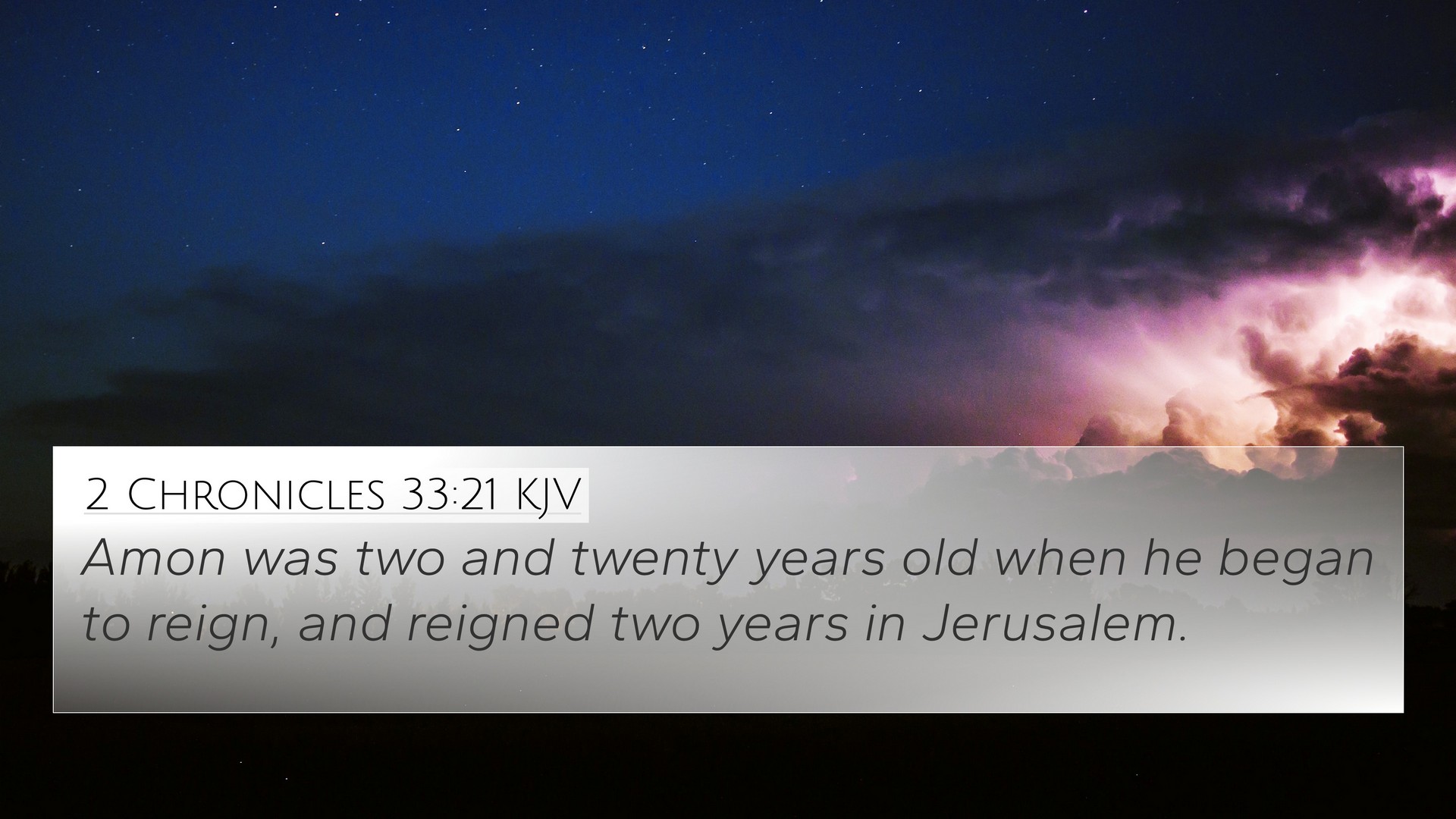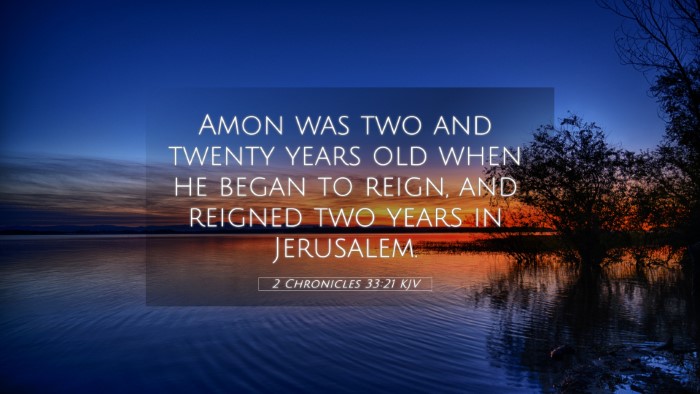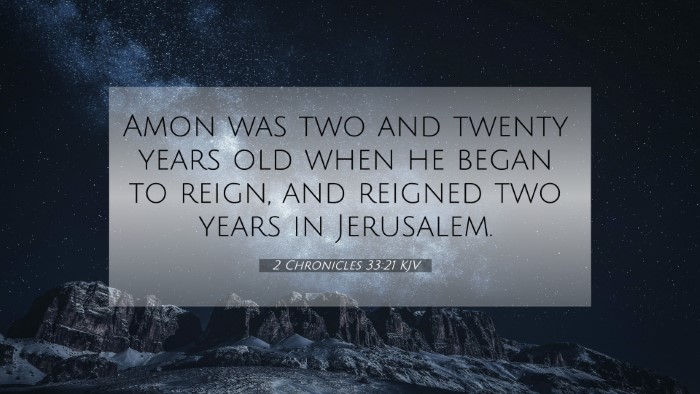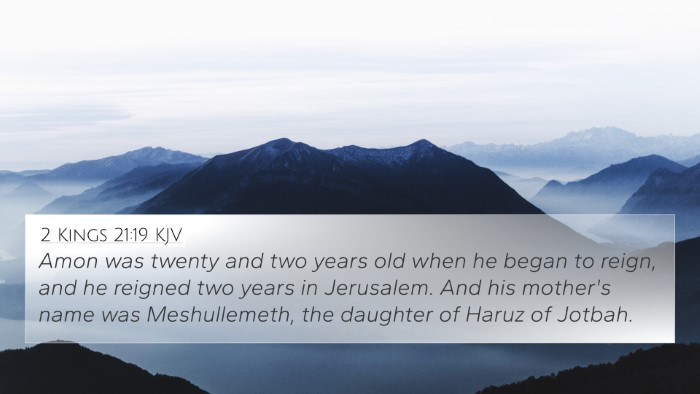Understanding 2 Chronicles 33:21
The verse 2 Chronicles 33:21 states: “Amon was two and twenty years old when he began to reign, and reigned two years in Jerusalem.” This scripture offers a brief yet significant insight into the reign of King Amon of Judah. To fully grasp its meaning, we can analyze various commentaries and contextual connections within the Bible.
Context of 2 Chronicles 33:21
To appreciate 2 Chronicles 33:21 properly, it's essential to consider the surrounding verses and the historical context of King Amon's reign. Amon succeeded his father, Manasseh, who had a tumultuous rule marked by idolatry and evil practices, leading Judah away from God.
Commentary Insights
Matthew Henry
Matthew Henry explains that Amon's short reign of just two years was not marked by repentance or reform. Instead, he followed in the sinful practices of his father, leading to his eventual assassination. Henry emphasizes the importance of leadership in a kingdom and how Amon's failure to seek God contributed to his downfall.
Albert Barnes
Albert Barnes provides additional details regarding Amon's age at ascension and his very brief rule. Barnes highlights that the verse serves as an introduction to the narrative of Amon's life, setting the stage for understanding the consequences of leadership that ignores divine guidance and the worship of the Lord.
Adam Clarke
Adam Clarke points out that Amon's reign is often overshadowed by his father Manasseh's extensive and influential rule. Despite being a king, Amon's actions reflect the tendency of human nature towards rebellion against God, particularly in leadership roles. Clarke suggests that the brevity of Amon's reign symbolizes the fleeting nature of power when not grounded in righteousness.
Thematic Connections in the Bible
2 Chronicles 33:21 connects to various themes within the biblical narrative, particularly the nature of kingship, idolatry, and divine judgment. Below are notable Bible verse cross-references that enrich our understanding of Amon's reign:
- 2 Kings 21:19-22 - Details the wickedness of Amon similar to that of Manasseh, emphasizing that Amon did not humble himself before God.
- 2 Chronicles 33:23 - Highlights the awareness of Amon’s refusal to repent, which led to his assassination.
- Proverbs 14:34 - Connects the idea that righteousness exalts a nation, contrasting with Amon's idolatrous actions.
- 2 Kings 21:16 - Describes the bloodshed and evil conducted by both Amon and Manasseh in Jerusalem.
- Micah 6:8 - Summarizes what God requires of His people, reflecting on the failure of leaders like Amon to do justly.
- Jeremiah 11:11 - Discusses the fate of those who turn from God, which echoes the fate of Amon.
- Galatians 6:7 - Highlights the principle of reaping what one sows, relevant to Amon’s actions and their consequences.
Comparative Bible Verse Analysis
Examining the connections between Amon and other biblical figures who faced judgment due to defiance against God offers profound insights into the consequences of sin:
- Kings of Israel and Judah: Comparing Amon with other kings like Jeroboam (1 Kings 14:16) reveals a pattern of disobedience leading to national downfall.
- Davids’ Righteous Contrast: In contrast to figures like King David (1 Samuel 13:14), who sought God, Amon illustrates the pitfalls of neglecting divine authority.
Understanding Leadership Through Amon
The lesson from Amon’s life is clear: leadership carries immense responsibility. A ruler's choices influence the moral trajectory of a nation. Through analysis of Amon's brief reign and the surrounding context, we recognize the connection between his actions and the overarching theme of divine justice in the Bible.
Tools for Bible Cross-Referencing
For those engaged in Bible cross-reference studies, many tools and resources are available. These can help you understand how various verses relate and provide deeper insights into scripture:
- Bible Concordance: Helps locate verses and their references across translations.
- Bible Cross-Reference Guide: Offers arrangements of scripture passages that share thematic or narrative ties.
- Bible Reference Resources: Includes commentaries and study aids that facilitate deeper understanding of verses.
Conclusion
In summary, 2 Chronicles 33:21 serves as a purposeful reminder of the weight of leadership and the importance of aligning one’s rule with God’s word. By understanding Amon's reign in conjunction with insights from public domain commentaries, we learn about the consequences of turning from righteousness and the divine expectations of those in power. Engaging in scriptural cross-referencing enhances our study of the Bible and enriches our comprehension of its interconnected themes.






